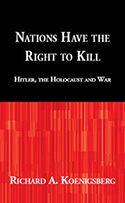The Final Solution, Chapter III:
If the best men die, shouldn’t the worst men be compelled to die as well?
|
In Allowing the Destruction of Life Unworthy of Life (1920), Hoche and Binding had posed the question: Why was Germany so promiscuous with the lives of some of its citizens (e. g., soldiers), while taking such care preserving the lives of other German citizens (e. g., mental patients in institutions). This question tied to a broader conundrum: why do the most valuable members of society live, while the least valuable members die? Hitler was deeply disturbed by a similar question: Why do some men die in battle—while others survive? The most virtuous men, in Hitler’s view, were those who had volunteered for military service. These men were more likely to die in battle. The worst men, on the other hand, were those who had acted to avoid military service. For every “hero who made the supreme sacrifice,” Hitler said, there were shirkers who had “cunningly dodged death.” The best human beings, as a result, were being “thinned on the battlefield;” whereas the worst men “wonderfully succeeded in saving themselves.” Why were the best men dying while the worst survived? If the best men were compelled to die, shouldn’t the worst men have to die as well? This question was identical in structure to the one posed by Hoche and Binding: If the state requires the death of soldiers, shouldn’t the state also require the death of mental patients? Best regards,Richard Koenigsberg, PhD Director, Library of Social Science |
| Why do Some Men Die in War—and not Others? | ||||||||||
Hitler never abandoned “Germany,” and rarely criticized the German military leaders, Hindenburg and Ludendorff. This does not mean, however, that he did not have doubts. In Mein Kampf (1924), Hitler conveyed his thoughts and feelings after he had learned (in November 1918) that Germany had signed the armistice and surrendered:
Still, Hitler could not—would not—condemn the German nation itself. Finally, he could not—would not—conclude that German sacrifices had been in vain. What occurred was that Hitler engaged in a psychological sleight of hand. He deflected the question of why so many Germany men had died into another question: Why had some men died—and not others. This question tormented Hitler throughout his life. The best German men, Hitler believed, were more likely to have died in the First World War. These were the virtuous ones—who had volunteered for military service and did not shy away from entering battle. On the other hand, Hitler explained in Mein Kampf, for every “hero who had made the supreme sacrifice,” there were “shirkers” who had “cunningly dodged death” at the pretense of being “engaged in business at home.” Consequently, while the “best human material” was being “thinned on the battlefield,” the worst people “wonderfully succeeded in saving themselves.” Those who survived were the “worst elements of the population” who preserved themselves by “taking advantage of absurd laws.” We return to the dialectic we discussed in a previous issue of the LSS Newsletter: Hitler’s classification of human beings according to whether they were willing or unwilling to sacrifice their lives for a national community. This classification of human beings structured Hitler’s perception of what had occurred during the First World War. On the one hand were human beings who had sacrificed their lives for Germany. On the other hand were “shirkers”—who had avoided sacrificing their lives. Hitler become obsessed—disturbed and enraged—contemplating the idea that some men had died in the war, whereas others had avoided fighting. How to deal with human beings who had refused to sacrifice their lives for Germany? Hitler’s answer to this question was the source of what followed. |
||||||||||
